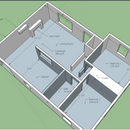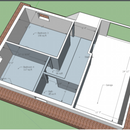Overanalyzing or overkill?
Morning All:
I’ve posted earlier on this project and got some great feedback. I have received some quotes on mini-split installation on my place in Seattle (Zone 4C) and am still waffling a bit. Early in the game I got a load calculation but feedback was it seemed high and after further consideration it probably didn’t include the insulation I’m installing in basement as part of remodel.
Soooo – I downloaded a short subscription version of HVAC Calc Residential version 4 and competed it to the best of my ability. Quick summary — 1945 house, 1 story with finished basement that rises about 3ft above ground and drive under garage. I installed new blown in fiber on all walls and 14 in in attack. New hardi siding all around. Kept existing vinyl windows. I’m remodeling basement. It has an internal french drain that has kept things dry. I am installing radon abatement in sealed sump basin. The perimeter walls will have 1/2 inch rigid between concrete and 2×4 frame for some thermal break. Frame will have an additional R13 between studs. (will also insulate and seal sills). Planning on 3/4 in rigid over plastic under ply on floor.
I had been looking toward mini duct between two adjacent bedrooms on first floor and same for two in basement.
The heating loads for the first floor rooms are 2227 and 2154 and these rooms open to the living area that will be supported by a wall mounted unit facing in their direction.
The loads for the basement rooms are coming in about 1087 and 980 respectively.
So my beating a dead horse question is — Would it make more sense go with resistance heat panels in these rooms rather than installing a concealed duct in between each pair?
If so, recommendations on sizing or products?
The net result would likely be a 12K BTU wall mount in the living/kit/dining area and a 6/7K BTU in a garage/multi-purpose room (That will also be insulated with a tight carriage door entrance)
The operating expense may be a bit more but there are fewer moving parts. The basement is fine in summer. These days we have maybe a week or two when AC seems relevant on the first floor. I’m also supported by 6500 kwh of solar that’s a net exporter at this point.
Thanks for input
GBA Detail Library
A collection of one thousand construction details organized by climate and house part












Replies
If you're going to heat/cool the first floor primarily with a wall unit a 3/4 tonner would be a better choice than a 1 ton. The total heat gain on the first floor is above the capacity of an AHRI "rated" 9000 BTU/hr at a 15F indoor-to-outdoor temperature difference, but your 1% outside design temp is in the low 80s, not the 90s. Your temperature delta will be much lower, and capacity higher, and the "rated" cooling capacity isn't the "maximum", and your latent loads are small. You'll have some margin there.
Both the Mitsubishi FH09NA & Fujitsu 9RLS3 have a max-cooling output of 12,000 BTU/hr, at 95F outdoors, 80F indoors.
The FH09 at full-tilt delivers 12,200 BTU/hr @ +17F outdoors, 70F indoors, 10.9K @ +5F the 9RLS3 is good for 16,000 BTU/hr @ +17F, 15K @ +5F. With a calculated load of 12K @ +28F outside 72F inside it'll stay above a code-min 68F with either of them until in single digits or low double digits outside.
As "backup" for the first floor bedrooms, install 600-650W (not more, if you can help it) of baseboard in each but leave them off until they're really needed. With the doors closed they probably won't stay above a code-min 68F when it's 28F outside even when the kitchen/living room is kept at 72F. This is primarily code compliance issue (which may or may not matter to you) an might become an issue at resale, or during the absolute coldest hours of the decade.
The heat loss of the bathroom is less than the heat output of a sitting adult human. 75-100 watts of heated towel rack, panel radiator or patch of low voltage radiant floor might be nice as a "cush factor" and would cover 100% of the load, but is not needed to keep the room at a code-legal temperature. If the main rooms are kept at 72F it'll stay above 68F in there even when it's 28F out and the door is closed. Anything over 150 watts would be too much. (Even Home Depot has a selection of electric towel racks in the right output range for under $200, but there are more options elsewhere if you consider going that route.)
In the basement bedrooms 200 watts of baseboard for the smaller room, 300 for the larger would get you there. Again, the bathroom doesn't need it, but 30-40 watts of heated towel rack or radiant floor might be nice.
The only basement room with a significant load is the rec room, and the total for the basement is barely more than the minimum output of a 3/4 ton mini ducted unit. A half-ton PTHP in a wall-sleeve might make sense. A half-ton Mitsubishi mini-split would modulate low enough to run efficiently in that space (and cover the entire basement load by 2x), but not so much more efficiently that it would ever make up the difference in cost between that and a half-ton PTHP such as a Gree ETAC-07HC230V20 or Amana DigiSmart PTH074G25AXXX or similar. The mini-split would be quieter, if that matters enough to rationalize the ~2x cost difference, but in an intermittently used rec room that's probably not a big deal.
If not a PTHP or mini-split, 1000 watts of baseboard covers the rec room load.
再次感谢Dana. I think I'll run with the upstairs unit and hold off on the Garage/Rec Room unit until I finish up the remodel. If I end up using a 240 line, I can pretty much go with any one of three options. I never thought about the towel rack's. That'd be a nice touch.